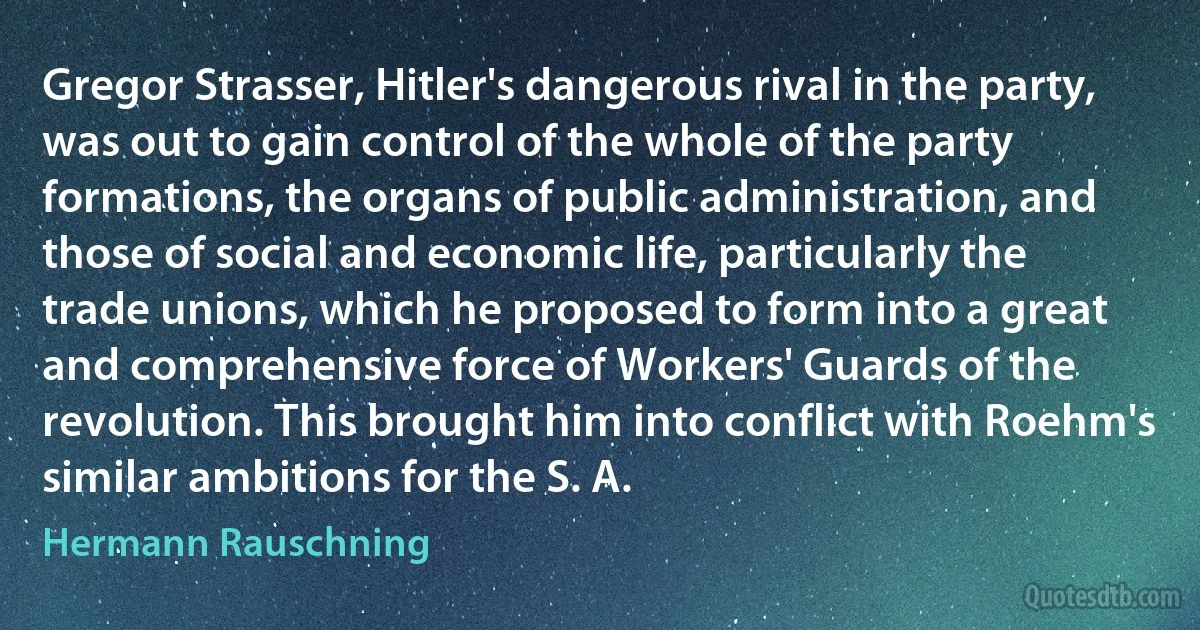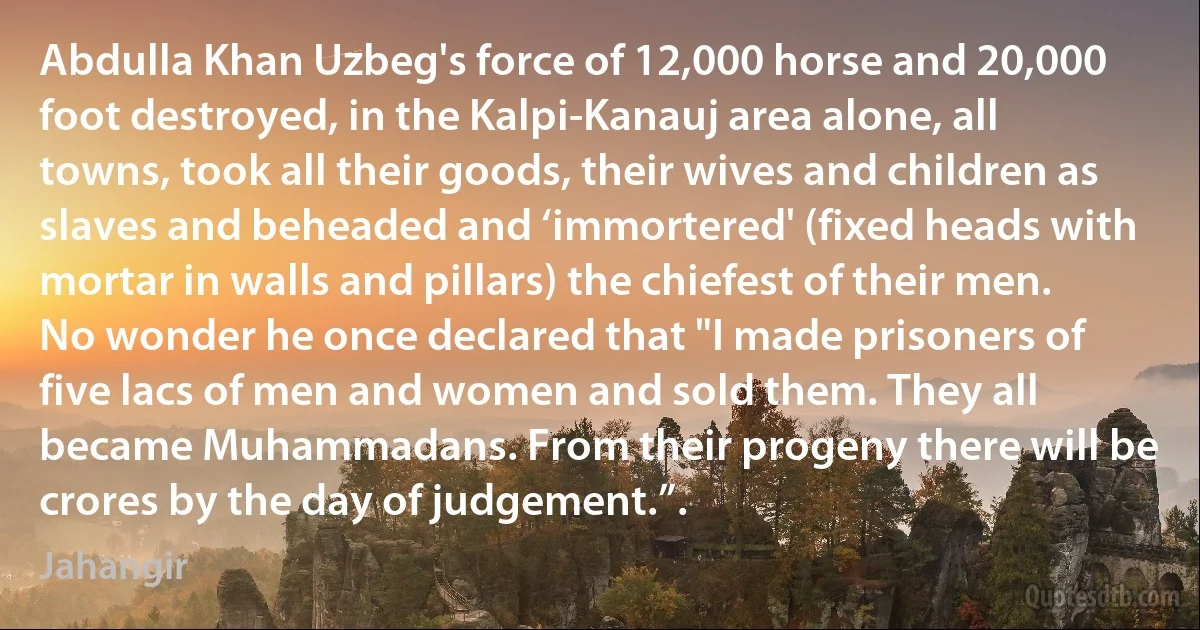Force Quotes - page 96
Gradually... during the second half of the nineteenth century, the uncomfortable feeling of dislike of the action at a distance, which had been so strong in Huygens and other contemporaries of Newton, but had subsided during the eighteenth century, began to emerge again, and gained strength rapidly.
This was favoured by the purely mathematical transformation (which can be compared in a sense with that from the Ptolemaic to the Copernican system), replacing Newton's finite equations by the differential equations, the potential becoming the primary concept, instead of the force, which is only the gradient of the potential. These ideas, of course, arose first in the theory of electricity and magnetism or perhaps one should say in the brain of Faraday.

Willem de Sitter
The Sultan now received information that there was a city in Hindustan called Thanessar, and there was a great temple there in which there was an idol called Jagarsom, whom the people of Hindustan worshipped. He collected a large force with the object of carrying on a religious war, and in the year AH 402 marched towards Thanessar. The son of Jaipal having received intelligence of this, sent an envoy and represented through him, that if the Sultan would relinquish this enterprise, he would send fifty elephants as tribute. The Sultan paid no heed to this offer, and when he reached Thanessar he found the city empty. The soldiers ravaged and plundered whatever they could lay hands upon, broke the idols and carried Jagarsom to Ghaznin. The Sultan ordered that the idol should the placed in front of the place of prayer, so that people would trample upon it.

Mahmud of Ghazni
The chief marched out to meet his enemy, and fought for three days with the Musulmans. On the fourth he fled, and sought to get back into the city; but the Musulmans reached the gate before the fugitives, overpowered them, and disarmed them. A dreadful slaughter ensued, the women were dishonoured, and the property seized. When Bahira saw this destruction, he fled with some trusty followers to the tops of the mountains. Mahmud sent a force in pursuit, which overtook and surrounded the party, and put all the chiefs to the sword. Bahira saw that no hope was left, so he drew a dagger and killed himself. Mahmud remained in Bhdtia until he had settled its affairs, and drawn up rules for its governance. He then returned towards Ghazna, having appointed a representative at Bhatia to instruct the people who had become Muhammadans.

Mahmud of Ghazni
At this moment the doctrine of force bars the way to settlement and fills the world with envy, hatred, malice, and all uncharitableness. But if the doctrine of force were once abandoned, so that the fear of war that stalks the world was lifted, all outstanding questions would become easier to solve.

Edward Wood, 1st Earl of Halifax
In the middle of the month of Safar, 593 H. (Jan. 1197), the world-conquering Khusru departed from Ajmir, and with every description of force turned his face towards the annihilation of the Rai of Nahrwala.... A severe action ensued from dawn to mid-day when 'the army of idolatry and damnation turned its back in flight from the line of battle. Most of their leaders were taken prisoners, and nearly fifty thousand infidels were despatched to hell by the sword, and from the heaps of the slain, the hills and the plains became of one level... More than twenty thousand slaves, and twenty elephants, and cattle and arms beyond all calculation, fell into the hands of victors.

Muhammad of Ghor
At length a force of three million S. A. men was pushing on behind him [Röhm], and God knew whither they were pushing. There were large numbers of Communists and Social Democrats among them; many of the storm troopers were called ‘beefsteaks-brown and red within. Jest were retailed such as the following: one S. A. man says to another: ‘In our storm troop there are three Nazis, but we shall soon have spewed them out.

Konrad Heiden
In the early 1960s there existed a successful quantum theory of the electromagnetic force (QED), which was completed in the late 1940s, but the theories of the weak and strong nuclear forces were not yet known. In UC Berkeley, where I was a graduate student during the period 1962 – 66, the emphasis was on developing a theory of the strong nuclear force. I felt that UC Berkeley was the center of the Universe for high energy theory at the time. Geoffrey Chew (my thesis advisor) and Stanley Mandelstam were highly influential leaders. Also, Steve Weinberg and Shelly Glashow were impressive younger faculty members. David Gross was a contemporaneous Chew student with whom I shared an office.

John Henry Schwarz
He felt with the force of a revelation that to throw up the clods of earth manfully is as beneficent as to revolutionize the world. It was not the matter of the work, but the mind that went into it, that counted -- and the man who was not content to do small things well would leave great things undone.

Ellen Glasgow
If being a werewolf is really a curse, you've got to treat it honorably. If werewolves are going to carry on, there has to be an incredibly powerful force. There is the business of the craving, the hunger for the kill. It has to be deeply pleasurable and more than an appetite for meat. There has to be a sensual dimension to it.

Glen Duncan
Earl Grey rose, and said, that the motion of the noble lord had his most entire and full assent...he could not sit silent on the occasion, impressed as he was with feelings of gratitude and admiration towards that great commander who was the subject of this vote, and deriving a just national pride from the consideration, that the honour of the country had been so greatly exalted by the conduct of that distinguished general and his brave army...the apparent contrast, or contradiction, as some might call it, between the sentiments which he had now delivered, and the opinions which he had expressed on former occasions...upon the whole it appeared manifest, that by the most exemplary and patient perseverance under unfavourable circumstances, and at the moment of action by the skilful combination of force and the most determined courage, a great success had been achieved, and as much honour done to the British army as any victory could have accomplished.

Charles Grey, 2nd Earl Grey
By another way, therefore, I endeavoured to attain the same end; and since it is a property of water that a small quantity of it, converted into steam by the force of heat, has an elastic force like that of the air, but, when cold supervenes, is again resolved into water, so that no trace of the said elastic force remains; I felt confident that machines might be constructed wherein water, by means of no very intense heat, and at small cost, might produce that perfect vacuum which had failed to be obtained by aid of gunpowder. But of the various constructions which can be contrived for this purpose, the following seemed to me to be the most suitable.

Denis Papin
As an example, the exploits of one of Jahangir's commanders, Abdullah Khan Uzbeg Firoz Jung, can provide an idea of the excessive cruelty perpetrated by the government. Peter Mundy, who travelled from Agra to Patna in 1632 saw, during his four days' journey, 200 minars (pillars) on which a total of about 7000 heads were fixed with mortar. On his way back four months later, he noticed that meanwhile another 60 minars with between 2000 and 2400 heads had been added and that the erection of new ones had not yet stopped. Abdullah Khan's force of 12,000 horse and 20,000 foot destroyed, in the Kalpi-Kanauj area, all towns, took all their goods, their wives and children as slaves and beheaded and ‘immortered' the chiefest of their men.

Jahangir
The authority of the State is not subject to negotiation, or compromise, or to divide its terrain with other moral or religious principles that might interfere in consciousness. The authority of the State has force and is true authority if, within consciousness, it is entirely unconditioned.

Giovanni Gentile
War has changed little in principle from the beginning of recorded history. The mechanized warfare of today is only an evolution of the time when men fought with clubs and stones, and its machines are as nothing without the men who invent them, man them and give them life. War is force- force to the utmost- force to make the enemy yield to our own will- to yield because they see their comrades killed and wounded- to yield because their own will to fight is broken. War is men against men. Mechanized war is still men against men, for machines are masses of inert metal without the men who control them- or destroy them.

Ernest King
The United States has never had the tradition of a military class. The President of the United States is the Commander in Chief of the Armed Services, and the officers and enlisted men of the Army, Navy, and Air Force are drawn from all classes of American life and must be trained from scratch.

Ernest King
Today no one who wishes to clean even a minimal regard for reason or evidence can espouse racist ideology as it was in its heyday, a system as comprehensive as Marxism and to some clearly equally as satisfying. However, thanks to Jensen and Eysenck and Shockley, the racist can cling to the periphery of his ideology; for example, he can provide a reasoned defence of his position on certain issues such as immigration and foreign policy. I do not wish to minimize the ground he has lost: the retreat from world history to little more than immigration quotas is a great defeat for the racist and a great source of satisfaction for all of his opponents. I am quite convinced that the refutation of racism in the light of reason is almost complete (the effort to eradicate it as a social force is a different matter and may never be fully accomplished). However, the last stand of the racist is not without importance, something I will attempt to demonstrate by giving a racist ideologue his say.

James Robert Flynn
![Instead of deluding public opinion with a notion that a sufficient application of force will provide a remedy, a wiser course would be to set about taking such steps as may be the means of recovering that consent without which society in Ireland cannot exist...[an offer should be made to the Irish] conceived on the most generous lines. (Edward Wood, 1st Earl of Halifax)](https://cdn.quotesdtb.com/img/quotes_images_webp/70/edward-wood-1st-earl-of-halifax-950970.webp)


